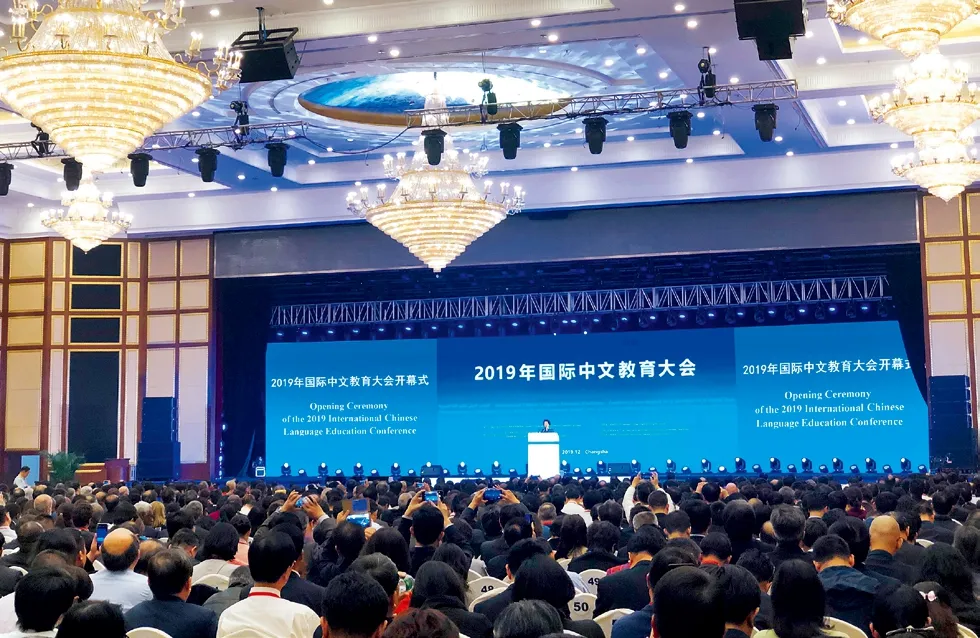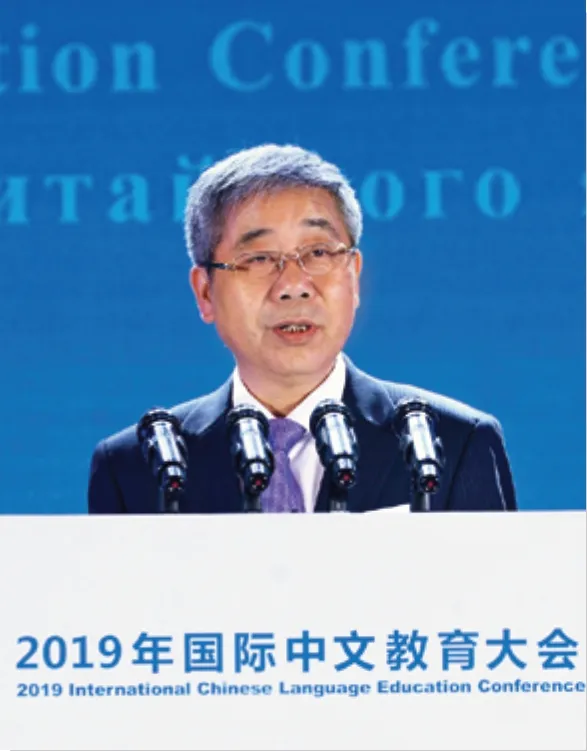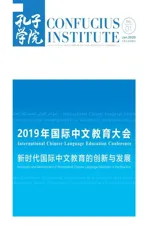2019年国际中文教育大会在长沙召开孙春兰副总理出席开幕式并讲话
2020-04-22

2019 年国际中文教育大会12 月9 日在长沙开幕,中共中央政治局委员、国务院副总理孙春兰出席会议并发表主旨演讲。
孙春兰指出,随着世界多极化、经济全球化、社会信息化、文化多样化的深入发展,世界各国相互联系日益加深,政治、经贸、人文等交流合作更加广泛。中国在扩大开放中深度融入世界,也为各国发展带来了机遇,到中国商务合作、学习交流、旅游观光的人越来越多。语言是沟通交流的桥梁纽带,各国对学习中文的需求持续旺盛,汉语人才越来越受到欢迎。现在很多国家将中文纳入国民教育体系,在大中小学开设汉语课程,支持企业、社会组织参与中文教育,促进了中外人文交流、文明互鉴和民心相通。
孙春兰强调,中国政府把推动国际中文教育作为义不容辞的责任,积极发挥汉语母语国的优势,在师资、教材、课程等方面创造条件,为各国民众学习中文提供支持。我们将遵循语言传播的国际惯例,按照相互尊重、友好协商、平等互利的原则,坚持市场化运作,支持中外高校、企业、社会组织开展国际中文教育项目和交流合作,聚焦语言主业,适应本土需求,帮助当地培养中文教育人才,完善国际中文教育标准,发挥汉语水平考试的评价导向作用,构建更加开放、包容、规范的现代国际中文教育体系。
开幕式由教育部副部长田学军主持,湖南省委书记杜家毫、教育部部长陈宝生分别致辞。陈宝生表示,语言教育是教育事业的重要内容,国际中文教育是世界各国民众学习中文、了解中国的有效途径。以孔子学院为龙头的国际中文教育事业,是中外双方的共同事业。他重申了孔子学院的宗旨和使命,代表教育部提出未来2-3 年支持国际中文教育的6 项创新举措,包括积极培养复合型高级国际中文教育人才,创办国际中文教师学院,增强外派中文教师岗位吸引力,实施精品教材工程,完善国际中文教育系列标准,支持和鼓励社会各界参与孔子学院建设与国际中文教育工作等。杜家毫向中外代表表示欢迎,总结了湖南省在中外教育人文交流中的成就,表示愿与各界携手奋进,以语言文化为纽带,与世界交流,散播友谊的种子,搭建合作的平台,促进互利共赢。
美国特洛伊大学高级副校长兰斯·塔特姆、北京语言大学校长刘利、罗马尼亚布加勒斯特大学中文系主任白罗米、马达加斯加塔那那利佛大学孔子学院本土教师吴妮、世界汉语教学学会副会长古川裕先后发言。
本次大会以“新时代国际中文教育的创新与发展”为主题,举办1 个专题论坛,32 个工作坊,围绕“中文+职业技能”,国际中文教育政策、标准、师资、教材、教学方法、考试、品牌项目建设,以及深化中外合作等议题讨论交流。来自160 多个国家和地区的1000 多名孔子学院和中文教育机构代表参加大会。
On December 9th, Sun Chunlan,Member of the Political Bureau of the Central Committee of the Communist Party of China (CPC) and Vice Premier of China, attended and delivered a keynote speech at the Opening Ceremony of the International Chinese Language Education Conference in Changsha.
Sun pointed out that as the world develops further in multipolarization,economic globalization, information-based society and cultural diversity, countries around the world are of increasingly profound interdependence where exchanges and cooperation in politics, economy and trade as well as culture are more extensive. In this situation, China is deeply integrated into the world with its greater opening-up,bringing opportunities for other countries’ development and attracting more and more people come to China for business cooperation, mutual learning and exchanges, tours and sightseeing.Language is the bridge of communication. Talents with Chinese language skills are becoming increasingly popular thanks to needs to learn the Chinese language among various countries have continued to be strong. To date, many countries have incorporated Chinese into their national education, set up Chinese courses in universities, primary and middle schools, and supported enterprises and social organizations to participate in Chinese language education, promoting exchanges and mutual learning between Chinese and foreign civilizations and enhancing people-to-people bond.
Also, she stressed in her speech that the Chinese government regards it as a bounden duty to push forward international Chinese language education, and believes the role of the country with Chinese as its mother tongue should be actively leveraged, thereby,providing support for people all over the world to learn Chinese in terms of teachers, teaching materials and courses. In addition, guided by the international practice of language spread,China will stick to market-oriented operation in supporting international Chinese language education programs,exchanges and cooperation carried by institutions of higher education, enterprises and social organizations at home and abroad, based on the principles of mutual respect, friendly negotiation as well as equality and mutual benefit.Such projects will focus on the language itself and local needs, facilitate the training of local Chinese education talents, improve international Chinese language education standards, and give full play to the evaluation-oriented role of the Hanyu Shuiping Kaoshi (HSK).That will make modern international Chinese language education system more open, inclusive and standardized.
Du Jiahao, Secretary of Hunan Provincial Party Committee, and Chen Baosheng, Minister of Education delivered their speeches in the opening ceremony chaired by Tian Xuejun,Vice Minister of Education. Chen said,language education is an important part of education, and international Chinese language education is an effective way for people around the globe to learn Chinese and understand China. International Chinese language education, led by the Confucius Institute, needs efforts both from China and foreign countries.He restated the purpose and mission of the Confucius Institute and, on behalf of the Ministry of Education, proposed six innovative measures to support international Chinese language education in the next two to three years, including cultivating compound and high-level international Chinese language education talents, establishing schools for international Chinese language teachers’ training, strengthening the attractiveness of the overseas posting of Chinese language teachers, compiling high-quality teaching textbooks,and improving international Chinese language education standards as well as supporting and encouraging people from all walks of life to engage in the Confucius Institute’s development and international Chinese language education. Du extended welcome to the Chinese and foreign representatives,summarized Hunan’s achievements in international Chinese language education and cultural exchanges. Hunan Province is ready to work with all social circles to communicate with the outside world by language and culture,and to build a platform for cooperation and to sow seeds of friendship, so as to promote mutual benefit and win-win results, he noted.
Participants who also made speeches were Lance Tatum, Senior Vice President of Troy University, Liu Li, President of Beijing language and Culture University, Luminita Rodica Balan, Director of the Department of Chinese Language and Literature of the University of Bucharest, ANDRIAMAMONJY Ratsimiseta Oniniaina a local teacher of Institut Confucius de l'Université d’ Antananarivo and Yutaka Furukawa, Vice President of International Society for Chinese Language Teaching.
Themed by “Innovation and Development of International Chinese Education in the New Era”, the conference holds a special forum that focuses on“Chinese + Vocational Skills”, and 32 workshops where participants discuss and exchange ideas on issues, such as,international Chinese language education policies and standards, teachers,textbooks, teaching methods, examinations, brand project construction, as well as deepening cooperation between China and other countries. The conference has attracted over 1,000 representatives from Confucius Institutes and Chinese language education organizations in 160 countries and regions.

